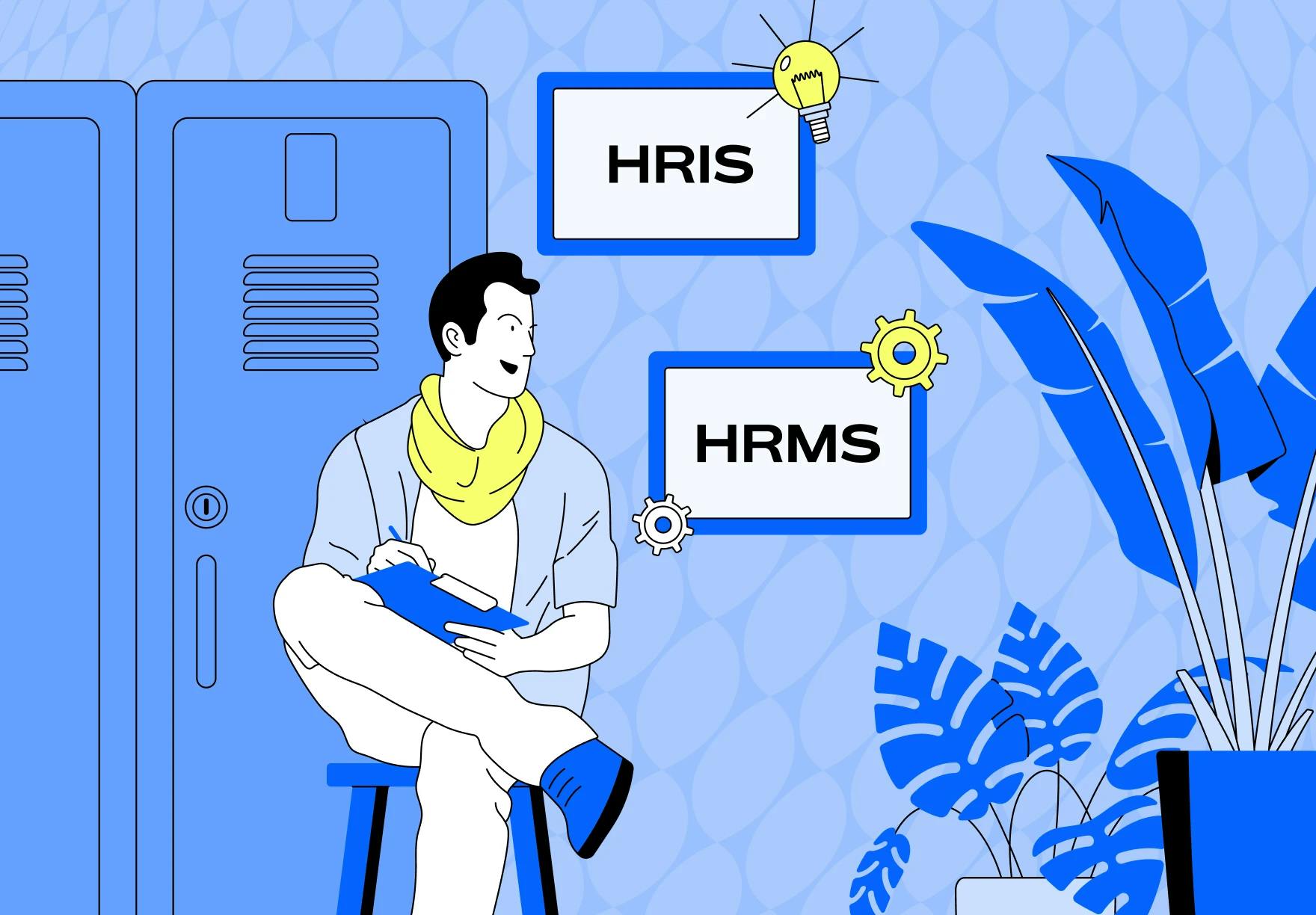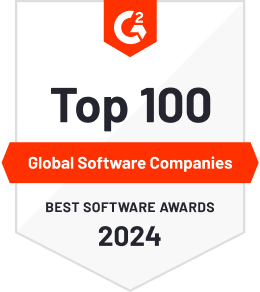
Global HR — 8 min

Global HR — 7 min
Unsure whether a human resource information system (HRIS) or human resource management system (HRMS) is the right fit for your business?
You’re not alone. Even for the most seasoned HR professionals, the list of HR acronyms can read like alphabet soup.
Though the terms are sometimes used interchangeably, HRIS and HRMS are used to refer to different types of HR systems.
Understanding the key differences between HRIS, HRMS, and human capital management (HCM) systems will help clarify what you want and need from an HR software solution.
We’re here to provide clarity on how the right HR software can help your organization excel at people management. Read on to better understand the differences between these HR software types and what factors to consider when choosing HR software for managing an international workforce.
We also want to go one step further. You should be searching for a tool your users actually want to use. You can’t afford to onboard an expensive system that takes extra time to manage and frustrates your team. We’ll walk you through what you should expect and how to find a tool that allows you to save time and improve the employee experience.
There are many reasons why 80% of businesses rely on HR software to stay competitive. These include the following:
Modern HR software solutions offer automation functions to save time and improve accuracy. Once you decide on a workflow, your HR software automatically detects inaccurate inputs, sends alerts or reminders (e.g., for contract renewals or mandatory training), and generates multivariable reports.
HR managers can focus on more high-level activities, such as employee experience or growth management, by automating repetitive tasks.
HR software can run a formal onboarding program, which can increase employee retention by 50% and productivity by 62%.
Employees can securely access their personal or payroll information from anywhere through HR platforms. They can also manage their information in one single platform, thanks to multiple integrations in HR software packages.
The latest cloud-based systems offer data security to protect employee and company information from hackers. These systems support a wide variety of integrations as opposed to storing data on company servers. This means that companies can enjoy price competitiveness alongside scalability. For these reasons, 44% of HR managers use cloud solutions to boost efficiency.
While it might seem trivial, your employees care whether their names are spelled correctly on their paychecks and personal documents. HR software employs automation, error detection, and seamless integrations in a single platform. This eliminates human error from vital HR processes.
An HRIS system might seem like another version of an HRMS system at first glance. But, there are differences.
As a general rule, an HRMS system adds a level of functionality to what an HRIS delivers, making it a better choice for larger and more complex HR operations. Consider HRMS as an enterprise-level addition to an HRIS.
All HR software platforms offer solutions for essential HR functions, like storing employee information securely, tracking employee hours and overtime, leave management, onboarding, and offboarding.
Designed for HR professionals, both HRIS and HRMS systems allow for multiple permission levels. This is to grant access to certain information to authorized HR personnel only.
The latest HRIS and HRMS systems use cloud storage, meaning employees can log in to track their work hours or view their pay stubs from any device, anywhere in the world. You can expect built-in cybersecurity features to protect employee and company data. There should also be client support from the software company.
While HRIS systems primarily focus on storing employee data to manage payroll and benefits, HRMS systems go a step further for human resources management.
For example, HRMS systems commonly include workflow management features that streamline specific recruitment, training, and compliance management tasks. They may also include a scheduling feature for projects.
An HRIS system is generally better suited for growth-focused small and medium-sized businesses (SMB) and mid-market organizations with relatively straightforward HR needs.
For organizations that use separate systems, tools, or spreadsheets for payroll, benefits, expenses, leave, and time tracking – the best HRIS integrate these core functions into a single hub. HRIS softwares allow growing organizations to keep HR teams lean, eliminate manual admin tasks, and minimize errors.
Organizations that choose an HRIS for their HR needs should choose systems that not only resolve their current HR pain points but also leave room for expansion as their organization scales in the future.
An HRMS may be too extensive for SMBs. Investing in HR software can be expensive and there’s no point paying for complicated or niche features that your business will not use.
Enterprise-level businesses or rapidly growing businesses with very specific needs might choose an HRMS system over an HRIS system. The added functionality of HRMS systems helps HR teams aggregate more in-depth data. For example, HR leaders can spot inefficiencies and develop new strategies to manage HR workflows at scale through HRMS reporting functions.
Many HRMS systems include infrastructure to assist with initial or ongoing training, and some include performance management functions that offer inputs for leadership teams to manage company strategy and direction. An HRMS might include a company-wide goal-setting portal, as well as an integrated performance review system.
Multinational enterprise organizations might require HRMS functions to support their core operations. As opposed to an HRIS system, an HRMS system might include advanced functionality for managing a global workforce, such as international payroll, global compliance management, and international benefits planning.
Remote’s dedicated global HR platform is purpose-built to help growth-focused companies manage a distributed team. Remote serves as one comprehensive hub for managing a global team - just without the enterprise price tag.
In fact, Remote HR Management platform is free to use!
And because no two businesses are on the same path, it’s easy to start hiring, managing, and paying employees with our range of optional pay-as-you-go products:
Use Employer of Record to compliantly hire and pay an employee in a country where you don’t have your own entity, all for one low, monthly fee.
Use Contractor Management to onboard and pay a local or international contractor for just $29 per month.
Use Remote Payroll to consolidate your multi-country payroll processes for just just $50 per employee per month and we’ll handle taxes, deductions, and compliance.
While the HRIS vs. HRMS classification matters during your initial search, you really just need to focus on selecting the best solution for your needs. Try not to get caught up in the different terminology as this can become murky with many providers trying to position themselves in multiple categories.
You also need to find a platform that will grow with you and maximize efficiency as you scale up. HR and leadership teams should have a clear picture of the functionality they require now and will require in the future in order to understand the scope of the system they require.
The partner matters too — choose software from a provider that values customer satisfaction and offers dedicated support. You also want a platform that your team will find easy to use on a regular basis, so a simple UI and clean design is important.
Consider the following factors when searching for HR technology solutions from different vendors:
Reliability and transparent cost structure
Integrations
Ability to configure analytics
User support
Space for AI and advanced chatbots
You also want to consider where you plan to hire. If your company is interested in global expansion, the average HRIS and HRMS platforms might not be a good fit.
You’ll still need a solution to help with the nuances of global hiring, such as managing compliance under ever-changing local labor laws and benefits.
Create an account with G2's top-ranked multi-country payroll software and start onboarding your first employees in minutes.

HR professionals face new and complex challenges with more and more offices going remote and workforces going global. Fortunately, technology offers a means for HR teams to efficiently manage payroll, benefits, training, and compliance.
A unified HR software solution offers significant benefits for any company with a distributed team. These tools automate time-consuming manual tasks, standardize company culture, and increase employee engagement. Choosing the right HR software is the issue.
If you invest in a tool that doesn’t have the features your company needs, you’ll have to purchase additional software to fill the gaps. This leads to more admin, software bloat, and creeping expenses.
On the other hand, a comprehensive system can be difficult to implement, expensive, and difficult to use, often leaving you paying for features you never use.
Either way, without the right system, you might not be able to properly support your staff and foster the culture you want.
When choosing a system, think about how much your business will need to account for remote flexibility, transparency, and global hiring. This is especially true if your organization is moving in the direction of a borderless workforce.
With hybrid or remote work becoming the standard, HR software with an employee self-service capability is essential. This feature will maximize efficiency and provide a better employee experience. At the minimum, you want a platform that supports any team member to access and edit their information, timesheets, and expenses documentation.
Aside from allowing employees to better manage their payroll, benefits, and timesheets, HR software can be an important tool in disseminating important information about a company’s culture and internal policies.
With remote and distributed teams, having updated and accessible information allows anyone working from anywhere to push work ahead asynchronously.
A centralized HR system will help you build a global company culture that remains uniform across various markets. The good HR system will standardize HR processes and internal policies to support your company's growth and employee engagement.
HR software is indispensable for companies that wish to compliantly onboard and hire global staff, as well as manage and retain top talent.
When expanding into global talent markets, employers need to make sure that their HR systems reflect local hiring and payroll requirements. Global HR softwares should also reflect your international staff's expectations of payroll, benefits, and trainings.
The important thing is to approach HR software with clear intentions and expectations. An HRMS generally has additional HR management functions compared to an HRIS. You can determine what type of software you need based on this information.
If you’re looking for HR software for global hiring, you might want to look beyond the traditional HRIS and HRMS systems and opt for a global HR solution. Otherwise, you won’t have the features you need to manage overseas workers with ease.
Contact us to learn more about how Remote helps businesses of all sizes attract and maintain talent in countries all over the world.
Subscribe to receive the latest
Remote blog posts and updates in your inbox.

Global HR — 8 min

Visas and Work Permits — 9 min

Global HR — 12 min

Visas and Work Permits — 8 min